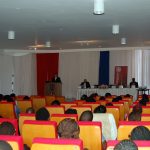
The three-hour conference organized by the Nigerian Association For Family Development (NAFAD), an affiliate of the International Federation For Family Development (IFFD), was hosted by the Lagos Business School (LBS) of the Pan-Atlantic University (PAU), Lagos, Nigeria on Wednesday, 25th of September 2013. The United Nations Department of Economic and Social Affairs (UNDESA) Focal Point on the Family was represented. Representatives of the various sectors of society attended: The Private and Public Sectors, Academia, Advocacies, Care-Providers, Non-Governmental Organizations, Christian and Muslim Religious Bodies, etc.
Policies contribute to the well-being of families and society
The Dean of LBS, Dr Enase Okonedo, in her welcome address urged participants to deliberate on the theme of the conference and provide some broad guidelines that could enhance employers’ sensitivity to the needs of the family by providing family-support services like creches for nursing female employees, paternity leave for fathers who may need it in emergencies and creating family-friendly packages and policies in general. She informed that the LBS won Award for the most family-friendly Nigerian Organization in 2012.
The United Nations Department of Economic and Social Affairs (UNDESA) Focal Point on the Family, Ms Renata Kaczmarska, who was represented by the National Information Officer and the Officer-in-charge of the United Nations Information Centre, Lagos, Mr Oluseyi Soremekun, called for the Development of policies for poverty eradication, work-family balance and intergenerational solidarity, which according to her would contribute to the well-being of families and society at large. She noted that there was an urgent need to further encourage social and economic policies that are designed to meet the needs of families and their individual members, especially the most disadvantaged and vulnerable members, and with particular attention to the care of children. She added that the civil society organisations should work together to ensure opportunities for family members to understand and meet their social responsibilities.
The President of the Nigerian Association for Family Development, an affiliate of the IFFD which is an independent organization of couples of all races, religions and nationalities operative in 63 countries in five continents and has a General Consultative Status with the United Nations ECOSOC, Ike Nnaedozie, noted that the IFFD in line with its core objectives has always been in the forefront on initiatives concerning the family. NAFAD, he said, has since its formal inception in 1986 worked assiduously to help build happy and stable families that provide support for each other and help other families through Family Enrichment Programmes for Parents with Children at various stages of development; Programmes for Couples, Young Adults and Grandparents; workshops, seminars and congresses in 8 cities in Nigeria and abroad.
He added that in line with the UN Resolution on Preparations for the Observance of the 20th Anniversary of the International Year of the family, the IFFD has been organizing and participating in conferences, seminars, workshops and meetings in the various continents. It has also established a think-tank called the Family Watch. It is cooperating with at least 27 Institutions in Europe on the Family in Transition project and has established an initiative, ‘The Declaration of the Civil Society on the occasion of the 20th Anniversary of the International Year of the Family’, which he urged the various NGOs present to accede to by visiting the
Round-Table with 7 speakers
A round-table with a panel of 7 discussants representing the Academia, Care-Givers, NGOs, Religious Organizations, Private Sector and moderated by Prof. James Tsaaior of the School of Media and Communication, Pan-Atlantic University, thereafter reflected on the various aspects of the theme and sub-theme:
– The Atse, (Tiv for hearth or fire place; Adiro meta in Yoruba) concept taken from the Traditional African Cooking Place representing Father, Mother and Child(ren) as the TRIPOD of African Nuclear Family Concept.
– The concept of the Cock as a Family property with a communal utility value for time-keeping as exemplified in the villages in Nigeria: A concept for being useful to the immediate family and the entire immediate community.
– The combination of both concepts to promote nuclear family cohesion and communal up-bringing of the younger generation of the community for greater awareness of the needs of others.
– Integrating cultural values of the moonlight folk-lore into family rearing to promote quality time together and inculcate lasting family and cultural values.
– Avoidance of the uncontrolled and dangerous incursions of the Internet, social Media, Television and Peers into the family to forestall the tragedies of juvenile delinquency and those associated with immoderate use of these otherwise useful technological platforms for growth, development, knowledge and communication.
– Avoiding by all means the misfortune of broken homes and its attendant woes on all concerned.
– Friendship, exemplary role-modelling, affection, discipline, communication and authority within the home as opposed to sStern authoritarianism, misplaced laxity and individualism to promote healthy development of children and healthy inter-personal relationships.
– Promoting the welfare of the under-privileged within the community and promoting the Nigerian cultural heritage of being our brother’s/sister’s keeper.
– Creating awareness of the role of good family relationships in promoting crime-free, civil and healthy communities and nations and reaching out to politicians and policy-makers for family-friendly policies that will enhance good societal values through proper upbringing of children and welfare of parents.
– Promoting good parenting skills through frequent and extensive Family Enrichment Programmes and seminars that involve policy makers.
– Making provisions for those at the margins of society, the physically and mentally challenged members of our families, in public and private sectors.
The conference ended at 1.30 p.m. with a Parliamentary session that ratified the points above and further suggested some action plans that will promote poverty alleviation among the vulnerable groups of Society, NGOs that can interphase between stray/delinquent/neglected children and their parents to reduce crime rate occasioned by parental neglect and community/governmental neglect of needy children and young adults.







